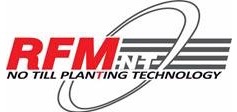Cereal killer's deadly touch could lead to new Wheat threat
- By: "Farm Tender" News
- Cattle News
- Nov 08, 2019
- 437 views
- Share

This article is bought to you by Orange Truck & Ag and RFM No Till.
Researchers from Australia's national science agency, CSIRO, together with partners in the US and South Africa have solved a 20-year-old mystery with findings published today in Nature Communications.
Their works shows that the devastating Ug99 strain of the wheat stem rust fungus (named for its discovery and naming in Uganda in 1999) was created when different rust strains simply fused to create a new hybrid strain.
This process is called somatic hybridisation and enables the fungi to merge their cells together and exchange genetic material without going through the complex sexual reproduction cycle.
The study found half of Ug99's genetic material came from a strain that has been in southern Africa for more than 100 years and also occurs in Australia.
The discovery shows that other crop-destroying rust strains could hybridise in other parts of the world, and scientists found evidence of this in their study.
It also means Ug99 could once again exchange genetic material with different pathogen strains to create a whole new enemy.
While it was proposed that rust strains could hybridise based on laboratory studies in the 1960s, this new research provides the first clear molecular evidence that this process generates new strains in nature.
Rusts are a common fungal disease of plants. Globally they destroy over $1 billion worth of crops each year. Australian crops have largely been protected for the past 60 years by the breeding of rust-resistant crop varieties.
Ad - Used Machinery buying opportunities at Orange Truck & Ag. We also rent - Ad
Ad - RFM No Till is revolutionary Planting Technology - Purchase now or defer your payment and save. RFM No Till is a DelayPay supplier - Ad
Group Leader at CSIRO Dr Melania Figueroa said Ug99 is considered one of the most threatening of all rusts as it has managed to overcome many of the stem rust resistance genes used in wheat varieties and has evolved many variants.
"While outbreaks of Ug99 have so far been restricted to Africa and the Middle East, it has been estimated that a nationwide outbreak here could cost Australia up to $500 million in lost production and fungicide use in the first year," Dr Figueroa said.
"There is some good news, however, as the more you know your enemy, the more equipped you are to fight against it.
"Knowing how these pathogens come about means we can better predict how they are likely to change in the future and better determine which resistance genes can be bred into wheat varieties to give long-lasting protection."
Earlier this year, CSIRO worked with the University of Minnesota and the 2Blades Foundation to achieve good results in wheat resistance by stacking five resistance genes into the one wheat plant to combat wheat stem rust.
This latest research is the result of a collaboration between scientists from CSIRO, the University of Minnesota, University of the Free State, and Australian National University.
The breakthrough came as Dr Figueroa's group was sequencing Ug99 (then at the University of Minnesota) and at the same time a CSIRO team led by Dr Peter Dodds was sequencing Pgt 21 in Australia.
Pgt21 is a rust strain that was first seen in South Africa in the 1920s and believed to have been carried to Australia in the 1950s by wind currents. When the two groups compared results, they found the two pathogens share an almost identical nucleus and therefore half of their DNA.
"This discovery will make it possible to develop better methods to screen for varieties with strong resistance to disease," Dr Figueroa said.
"There was an element of serendipity at play in this work. We never expected that Ug99 and an Australian isolate might be related but only through a multi-continental collaboration was it possible to make the connections needed to achieve this discovery."
Ad - Used Machinery buying opportunities at Orange Truck & Ag. We also rent - Ad
Ad - RFM No Till is revolutionary Planting Technology - Purchase now or defer your payment and save. RFM No Till is a DelayPay supplier - Ad












Share Ag News Via